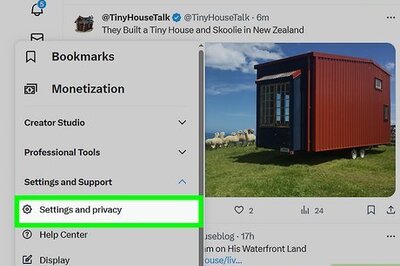
views
X
Trustworthy Source
Centers for Disease Control and Prevention
Main public health institute for the US, run by the Dept. of Health and Human Services
Go to source
The symptoms include fever and an itchy, blister-like rash. In rare cases, more severe complications can occur, including bacterial infection of the skin, pneumonia and swelling of the brain. Preventing chickenpox by keeping healthy and limiting your exposure to the virus are good practical ideas, although vaccinations are commonly recommended in many countries, particularly the United States, Australia and Canada.
Preventing Chickenpox

Get vaccinated for chickenpox. The vast majority of medical authorities believe that getting the chickenpox vaccine is the best way to prevent chickenpox. Vaccination introduces weakened viral particles to your immune system so that it can mount a strong response when it comes in contact with stronger, more virulent particles. According to the Centers for Disease Control and Prevention, before the introduction of the varicella vaccine in 1995, about 4 million Americans were infected with chickenpox each year — currently, that's dropped to about 400,000 yearly. The varicella vaccine is usually given to toddlers between the ages of 12-15 months, and then again between 4-6 years. For previously non-immunized teenagers or adults, the vaccine is given as a series of 2 injections, separated by 1-2 months between shots. If you are unsure whether or not you're already immune to chickenpox, your doctor can administer a simple blood test to check for immunity to varicella. The varicella vaccine can be combined with the vaccines for measles, mumps and rubella, in what is known as the MMRV vaccine. It's estimated that a single vaccination is between 70-90% preventative for chickenpox infection, whereas a double dose is about 98% protective. If you do get chickenpox after being vaccinated, the case is usually mild. If you've had chickenpox, you don't need the varicella vaccine because you already have natural immunity (resistance) against it. The varicella vaccine isn't approved for pregnant people, people with weakened immunity (because the vaccine can actually trigger a chickenpox infection), and people who are allergic to gelatin or the antibiotic neomycin.

Keep your immune system strong. Like any viral, bacterial or fungal infection, true prevention depends on the proper functioning of your immune system. Your immune system is made of specialized white blood cells that search and destroy potential pathogens, but when the system is weak or lacking in resources, disease-causing microorganisms grow and spread virtually unchecked. Thus, it's not surprising that those most at risk of most infections, including chickenpox, are babies and people with compromised immune systems. As such, focusing on ways to boost your immune system is a logical approach to naturally preventing chickenpox. Getting more sleep (or better quality sleep), eating more fresh fruit and vegetables, cutting down on refined sugars, reducing your alcohol consumption, quitting cigarette smoking, practicing good hygiene and light exercise are all proven ways to keep your immune strong. Dietary supplements that boost immunity include: vitamin C, vitamin D, zinc, echinacea and olive leaf extract. People can develop weakened immune systems due to illness (cancer, diabetes, HIV infection), medical treatments (surgeries, chemotherapy, radiation, use of steroids, over-medicating), chronic stress and poor nutrition.

Avoid other children and adults with chickenpox. Chickenpox is highly contagious because it not only spreads directly from touching the blisters, but also through the air (via coughing and sneezing), and it can survive for short periods of time in mucus on various objects. Thus, avoiding people who are infected is a good strategy to help prevent contracting chickenpox. The tricky part is that chickenpox becomes contagious up to 2 days before the rash appears, so it's not always obvious who is infected. A mild fever is often the first sign of infection, so that might be a better indicator that your child has come down with something. Sequestering your child in their room (while being properly fed and hydrated, of course) and keeping them home from school (for at least a week) is a practical way of preventing the infection from spreading to you and other children. Having them wear a surgical mask and keeping their nails trimmed short also help prevent the spread of the virus. It typically takes from 10-21 days after exposure to chickenpox to develop an infection. Chickenpox can also be spread by contact with the rash in people with a condition called shingles (although not via airborne droplets from coughing or sneezing), because it too is caused by the varicella zoster virus.
Preventing the Spread of Chickenpox

Disinfect your house and hands. Because chickenpox is so contagious and can live outside the body for short periods of time, you should be vigilant about disinfecting your house as a form of prevention if your child or other household member is infected. Regularly disinfecting countertops, tables, the arms of chairs, toys and other surfaces which may have come in contact with the infected person is a good preventative approach. Consider giving over a bathroom solely for the infected person to use while they're ill, if that's possible. Furthermore, disinfect your hands multiple times daily by washing them with regular soap, but don't go overboard on the hand sanitizer or antibacterial soap, because it can promote the growth of "super bugs". Natural disinfectants for household use include white vinegar, lemon juice, salt water, diluted bleach and hydrogen peroxide. You should also make sure that the clothes, bed sheets and towels of the infected person are regularly and thoroughly washed — add baking soda to the laundry for more sanitizing ability. Make an effort not to rub your eyes or put fingers in your mouth after you've touched someone with chickenpox.

Let the illness run its course. As chickenpox is not a serious illness in the vast majority of cases, letting it run its course is the best way of gaining natural immunity to the varicella zoster virus, which will prevent future infections. A typical chickenpox infection lasts between 5-10 days and entails the development of the telltale rash, mild fever, loss of appetite, mild headache and general fatigue or malaise. Once a chickenpox rash appears, it goes through 3 phases: raised pink or red bumps (papules), which break out over a few days; fluid-filled blisters (vesicles), which quickly form from the papules before breaking and leaking; and crusty scabs, which cover the broken vesicles and take several days to fully heal. The itchy rash first appears on the face, chest and back before spreading to other areas of the body. As many as 300-500 blisters can form during a chickenpox infection.

Talk to your doctor about antiviral drugs. In addition to preventative vaccination, drugs called antivirals are recommended for people who have a high risk of complications from chickenpox, or sometimes they are prescribed to shorten the duration and prevent the spread of the infection. As the name suggests, antivirals are able to kill viruses or prevent them from reproducing in your body. Commonly prescribed antivirals for the treatment of chickenpox include acyclovir (Zovirax), valacyclovir (Valtrex), famciclovir (Famvir) and immune globulin intravenous (IGIV). These medications are used more for lessening the severity of chickenpox symptoms, as opposed to preventing them, so they are usually given within 24 hours after the telltale rash appears. Valacyclovir and famciclovir are only approved for use in adults, not children. Natural antiviral compounds that you can take as supplements include vitamin C, olive leaf extract, garlic, oregano oil and colloidal silver. Ask a naturopath, chiropractor or nutritionist about how to protect yourself from chickenpox with natural antivirals.


















Comments
0 comment